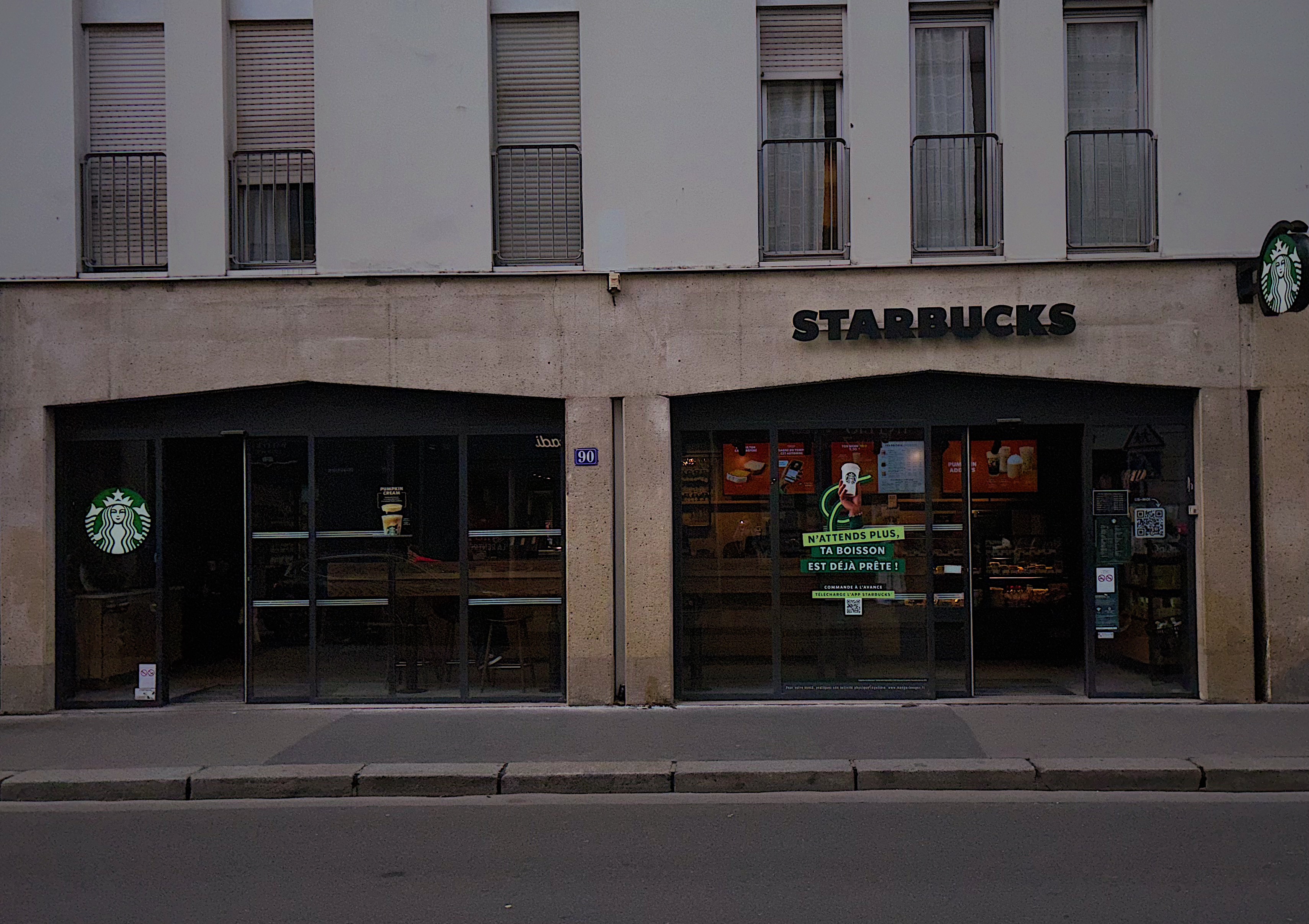Between Nostalgia and Boycott

When scrolling through the Peacock Plume website, one could get the impression that AUP students live for the Parisian café culture. Articles ranging from Paris' best gluten-free cafes and restaurants to your barista's style to comparing two of Paris' most infamous cafés paint a remarkable picture of what AUP is interested in. But why is it then that you see such a large number of the typical green and white Starbucks cups around campus?
Starbucks certainly wins in the "Whose menu offers more" game, letting its customers personalize their drinks in almost any conceivable way. However, the quality of Starbucks' drinks is under debate. To many, the company's drinks are overpriced and underwhelming. Nevertheless, there seems to be an attraction point for many students to Starbucks. The choice to go to Starbucks is sometimes just one of practicality, as the nearest store is right on rue Saint-Dominique, just a five-minute walk from all AUP buildings. More importantly, frequenting Starbucks has also become a habit for many students, some even feeling a sense of nostalgia attached; this is exactly what the company wants you to feel. For some students to whom I spoke, even the packaging has a "cult status," with its iconic green and white logo. In layman's terms, when you enter one of the company's stores, whether in Paris or San Fransisco or the middle of Kansas, you are in a Starbucks, nevertheless.
@steven_clarke88 Starbucks warning #starbucks ♬ Suspenseful and tense orchestra(1318015) - SoLaTiDo
Starbucks' Controversies
Whether you like or do not like Starbucks in terms of its quality and pricing, a more extensive debate has emerged around the ethical concerns of supporting the company. One of the biggest issues with Starbucks is its ecological impact: from its single-use cups to the sourcing of its coffee beans, the company has received a lot of criticism in recent years for how it reacts (or does not) to the issues of climate change.
On October 7th, 2023, another point of ethical concern emerged and aggravated the debate around whether it's "okay" to frequent Starbucks or not: the ongoing war in Gaza (Palestine). But why boycott Starbucks, which has never openly taken a stance on the war? At the end of last year, Starbucks Workers United (SWU) was forced to delete a post stating, "Solidarity with Palestine!" after the company reacted with a copyright infringement lawsuit openly disagreeing with the stance of SWU. The company's boycott is significant to many AUP students, such as Carolyn Franano, who told me, "Boycotting is very effective and is such an easy thing to do." This argument was perpetuated by several other students, who also boycotted Starbucks, often referring to the amazing alternatives they found in local cafés, such as Bleu Olive or Café Noir. However, this opinion starkly contrasts with that of students who feel connected to the brand, reminding them of home and making them feel like part of a larger community.
But do these emotions justify supporting a company that has undergone more than one wave of criticism? Raneem Grira, a third-year at AUP, who frequented Starbucks often before October 2023, stopped supporting the business entirely after its blatant disagreement with SWU. In her opinion, Starbucks coffee is not only "bland" and "overpriced," but it also calls for a level of guilt to be felt. "My opinion stands firm on the idea that you should all have a little more shame; so openly supporting a brand and product aligned with investing in genocide." Her statement, mentioning how she has also boycotted Pret A Manger for some time, shows that the act of boycotting (or not) has a lot to do with how much your life is politicized. Many students may not even be aware that Starbucks is under much more criticism than its mere environmental impact.
Starbucks has lost $12 billion from boycotts worldwide due to its support for Israel. pic.twitter.com/Mm2nkpfcJt
— Pop Tingz (@ThePopTingz) December 6, 2023
Dividing AUP's Student Body
The most often repeated argument against boycotting Starbucks is the idea that your individual actions do not matter. Many students are aware of the controversy but feel like their actions are insignificant because large companies couldn't care less about what a single AUP student does. In this mindset, one person's actions cannot really affect a whole nation's or planet's issues. This phenomenon is often called the "bystander effect" or "diffusion of responsibility." In the context of global issues, it can also relate to "individual agency" or "social loafing," where people believe their contributions are insignificant in the grand scheme, leading them to feel less motivated to act. This mindset can hinder collective efforts to address important issues like climate change, social justice, and public health. While this may ring true, if everyone thinks this way, then clearly no change will be made; if enough people abandon this mindset, it changes from just "one person's" actions to many more.
Whether conscious or not, the decision to frequent Starbucks divides the AUP student body. Carolyn Franano told me, "It makes me so angry and disappointed to see other AUP students carrying Starbucks cups around. When I see someone still goes there, I have to say it makes me see them differently." While no student who still buys Starbucks products has told me about encountering any open criticism about their behavior, there is, nevertheless, an internal process going on. These developments call for students to be open to public debate before this hidden dispute rises too high.
AUP's student body is obviously divided on the topic. The green and white cups are still integral to the campus' image, and some cannot imagine it any differently. Certainly, the company has a great branding strategy, which makes it easy, convenient, and even nostalgic to get a drink there. On the other hand, ethical and moral questions must be considered. Ultimately, the question is: How will the debate about the controversy change (or not change) the atmosphere at AUP?





